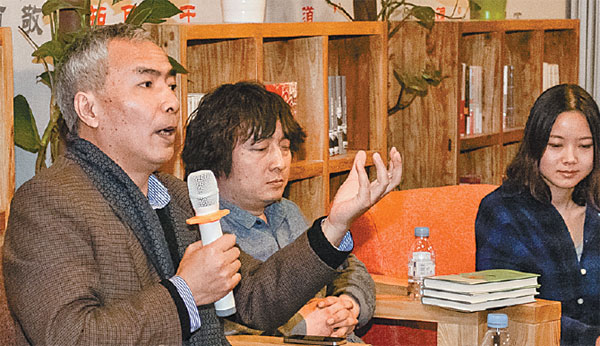Remembering a golden age of letters
Updated: 2014-03-25 07:23
By Sun Ye (China Daily)
|
|||||||||||
There was a time when a novel easily sold a million copies, short-story writers were megastars and penning a screenplay felt like a step down.
Sadly, that golden era for literature, the 1980s in China, has long gone.
"It was the best of times when literature assumed the most important role of all," Ge Fei, renowned writer and professor with the Department of Chinese at Tsinghua University, said at the launch of his latest book Encounter in Beijing.
|
Ge Fei (left) shares with readers his opinions about the past glory and present state of Chinese literature at his book launch. Provided to China Daily |
"Back then, it took the functions of other things and people talked about literature instead of the economy."
Ge made his name in the 1980s with engulfing, experimental short stories. Encounter, published by Yilin Press, is a collection of Ge's favorite short stories he has written over the past three decades.
Lost Boat, one of his early works, won him instant, nationwide fame. He was approached by film director Zhang Yimou, who wanted to adapt the story into a film.
"But I was too embarrassed to tell anybody about the offer," Ge recalls. "Back then, fiction-writing was such a holy calling - so much higher than everything else that when you're writing a script for a film or trying to make money out of it, you feel it as a backslide."
The liberal, culturally enriching period, concurrent with the economic reform, saw writers and artists as the elite whose opinion everyone else sought and looked up to. "It's hard to imagine a million people lining up, waiting to read one's latest article, but it was true," Ge recalls.
But the time when literature was glamorous - a phenomenon not unique to China - is gone.
"For the West, the golden era was the 19th century," Ge says. "Ours came later and has a lasting influence on today's culture. But just like other peak times of literature, we will never enjoy it again."
For him, the golden era was unsustainable in its nature. "If you study the history and scope of literature, authors weren't able to live on royalties and writing couldn't qualify as a means of living for most of the time."
"The 1980s, with its blossoming of art and culture, is abnormal in itself," he says.
That era came to an end for both political and economic reasons in the early 1990s. Ge himself had gone on a hiatus for some 10 years until the urge to write returned in the mid-noughties.
"Now, if you think about what capital has done to culture, dictating how to spend whatever time we have, it's horrifying," Ge says. "But then, this is a different time and we're piqued by a wholly different set of things."
Feng Tang, a writer who went through the 1980s as an avid reader, also missed the golden age. "Literature was the talk around the table and authors were always trying out new things," he recalls. "Now, so many once-dedicated writers are flippant and insincere with their works."
But one should not lose the faith in literature.
"Now, it has returned to a more normal state," Ge says.
"And literature will continue to do what it does best - if you want to get to know a place or a person really thoroughly, fiction-reading is still the best, most in-depth way."
sunye@chinadaily.com.cn
(China Daily 03/25/2014 page22)
Today's Top News
Xi pledges to bolster nuclear security
Kremlin 'ready' to work with G7
Beijing among most polluted areas
China eyes 'Cathay' tulip import
President takes detour on state visit to France
US mudslide death toll climbs to 14, 176 missing
Courier, customer brawl in Chongqing
Tibet Airlines to open four new routes
Hot Topics
Lunar probe , China growth forecasts, Emission rules get tougher, China seen through 'colored lens', International board,
Editor's Picks

|

|

|

|

|

|






